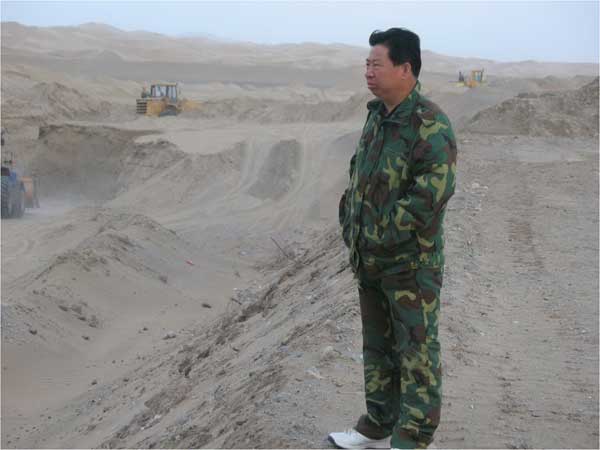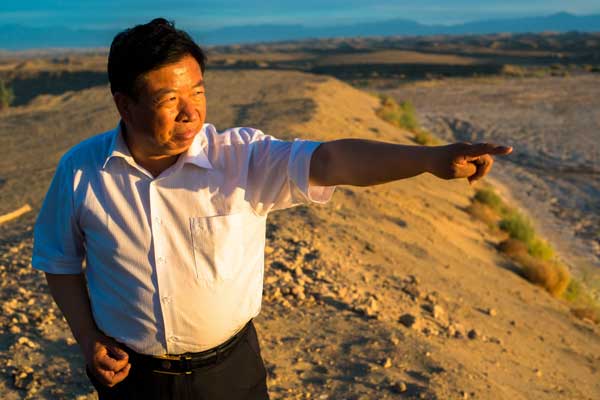The Chinese Dream | He Yanzhong
He Yanzhong has been toiling in the desert in Dunhuang, Gansu province, for 13 years,determined to transform it into a fishery oasis. Sun Yuanqing follows his arduous journey andfinds out what keeps him going.
He Yanzhong felt his legs weakening and his head spinning. Before he could make sense of whatwas going on, he collapsed to the ground. A total of 21 hours passed before he woke up from thecoma and found himself in the hospital.
This was only one of the four times He was almost killed whileconducting field research in the difficult conditions of the desert inDunhuang in Gansu province in Northwest China, where he isdetermined to transform one area into a fishery oasis.
"I cannot bear the disgrace of retreating from something I initiated,"He says, recalling his 13-year combat in the desert.
Fishing in the desert may sound absurd, but He, who has beentoiling with his colleagues for 13 years and invested 280 millionyuan ($46 million), has proven that it is not only possible, but alsobeneficial to the ecological environment and local community atlarge.
"People thought I was crazy to put all this money into the desert instead of real estate and the banks. But here, the money can turnthe environment into a liveable one for everyone. For me, this is thetrue value of money," says 52-year-old He, who is the founder andchairman of Bibo Company, which develops cold-water fisheries.
He was voted by tens of thousands of netizens as one of "the Grassroots Heroes of 2013" aheadof an award ceremony hosted by Xinhuanet.com in early January.
"This is more than an affirmation for my personal effort. It shows the public's increasing awareness of desertification in China," he says.
He feeds the rainbow trout at his fishery in Dunhuang.
|
China is one of the countries most severely impacted by desertification. There are 2,620,000square kilometers of land degraded by desertification in China, which makes up one-third of thenational territory and causes more than 54 billion yuan ($ 9.59 billion) of economic loss a year,according to the State Forestry Administration.
In Gansu province, the situation is worse. Almost half of the land has gone through desertification.In Dunhuang, no matter how many trees the locals grow, they eventually die off becauseof extreme drought.
"You could dig as deep as 20 meters into the ground and still beunable to find any underground water," He says.
But years after He and his employees arrived in Dunhuang, springstreams have started running just 2 meters under the ground, asthe waterways he built filter the floodwater and enrich the soil. Morethan 100 fishponds have been built and more than 800 tons ofrainbow trout are harvested every year, not only to feed the localpopulation, but also all over China.
When a once-in-a century flood happened in 2011, completelydamaging the fishery, Yangguan county downstream of the fisheryremained intact thanks to the flood diverted by the fishery.
The fishing industry not only protects the locals' lives, it also bringscomfort. One mu (0.07 hectare) of fishing pond produces about10,000 kilograms of fish, which brings more than
60,000 yuan($9,774) of profit,600 times more than the profit from growing wheat. The fisheryhardly consumes water while 1 mu of wheat uses up to 600 tons of water a year.
Born in rural Gansu, He was the first to develop a cold-water fish industry in Gansu. Cold-waterfish, such as salmon, sardine and trout, are considered healthy eating and attract high prices atmarket. By 2000, He was already a billionaire and deemed as "the king of rainbow trout". In2001, He was invited by the Dunhuang municipal government to invest in Dunhuang, a historicalcity threatened by the Kumtag desert.
"There was nothing but sand. No water, road, or electricity," He recalls his first days in Dunhuang.
But He was confident that once he drew the snow water from the neighboring Qilian
Mountains and Altun Mountains to the desert, it would be a perfect area to develop fishing.
 |
Photo Provided to China Daily
|
The reality proved harsher than He had thought. Sandstorms swept away forestry they had just planted and heavy summer rain and debris filled up fishponds that had just been excavated. Thebiggest disaster came in 2011 when tens of thousands of brood fish that took decades to breedand millions of marketable fish were washed away in the debris flow, causing losses of at least160 million yuan to the company.
"I realized that a flood was more horrible than desert. We can never survive as a company if
the ecology at large doesn't improve," He says.
His daughter He Yuting was with him throughout the 2011catastrophe. "I never understood why my father had gone so far to develop fishing in a desert away from home, but after I witnessed how devastated he and his colleagues were after the flood, I cameto emphathize with him," his daughter says.
He soon invited irrigation experts and ecologists to Dunhuang to investigate the routes of the flood. A total of 13 waterways, which run more than 90 kilometers in total, were built to divert the flood.
The waterways, built with locally sourced rocks and sand, produce clear water for fishing. More than 20 kilometers of trees and grape yards were built alongside the river, which pushed the desert more than 5 kilometers back.
He is not alone in realizing his dream of building an industry chain that starts in the fishery and goes on to benefit the local ecology and further boosts tourism.
The Chinese Academy of Sciences has established a research center in the fishing base toassist and promote the ecosystem He initiated. More than 400 people have come to work in the fishery, and more than 200 have decided to stay in the desert.
"The job is tough but we are seeing more hope everyday. He has been a role model for us
with his persistence and down-to-earth attitude," says Sun Huili, who has been working with He for a decade.
Both He's son and daughter have come back to help him after graduating from universities.
"The job is far from done. There are still hundreds of hectares of desert to conquer. We hope the next generation will continue our effort," He says.
 |
Photos Provided to China Daily
|
Q&A
Q: What's your dream?
A: When I first came to Dunhuang, my dream was rather simple. I planned to set up a cold-water fish industry chain that benefits from the snow water from the nearby Qilian Mountains. But after my dream was stranded in the desert, I realized that without a good ecological environment, it's impossible for anyone to succeed. I began to take the larger picture into consideration. Now my dream is to build up an industry chain that starts in the fishery and goes on to benefit the local environment and eventually promotes local tourism.
What's your take on the Chinese Dream? How is it related to your dream?
People are always worried about food safety and pollution. In the rural area where I work,
people also have problems related to overuse of the land and low income. Restoring the ecosystem has been put on the national agenda by the 18th National Congress of the Communist Party of China.This is also my dream. With what I am doing, I utilize snow water, which is probably one of the few water resources that has been untouched by pollution. By drawing the water to the desert, we breed the trout while enriching the soil. It also saves water and increases the farmers' incomes.
How have you built trust and cooperation with locals to achieve a common goal?
When we first came to Dunhuang, the locals didn't show much interest. But it didn't take long for them to figure out that fisheries are much more lucrative than growing wheat, and I try to
involve as many local people as I can. There are more than 200 local people working in my fishing base or who have set up their own business.
What will China be like in 20 years?
Some 20 years ago, people had no idea what I was doing. But now, I don't even have to
explain what rainbow trout are and how fisheries are more eco-friendly than crop farming. The social awareness of healthy food and environment has been increasing very fast. I expect that 20 years from now, the government will have set up strongerpolicies to support ecofriendly industries and we will have more professionals specializing insuch matters.




No comments:
Post a Comment